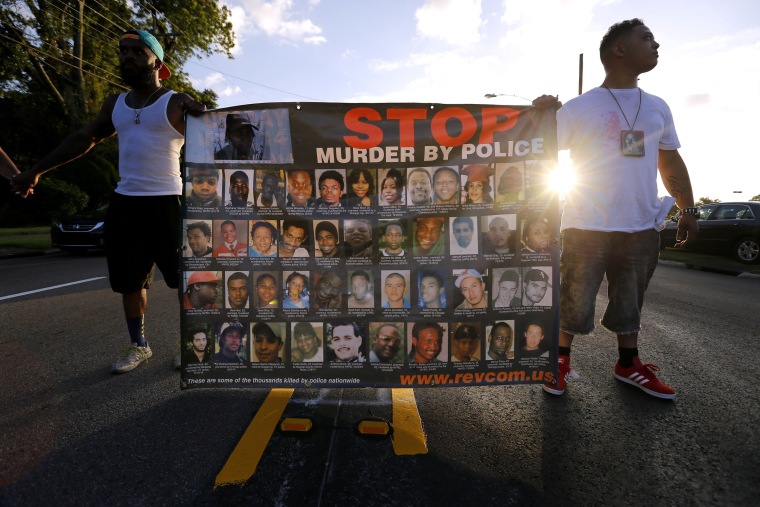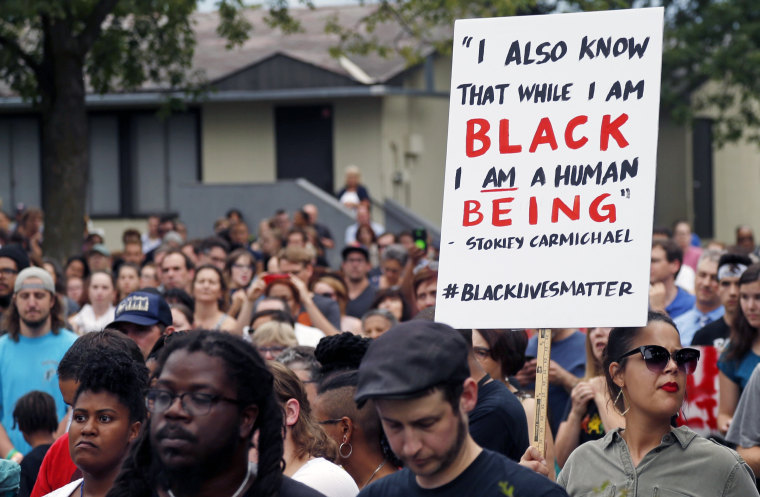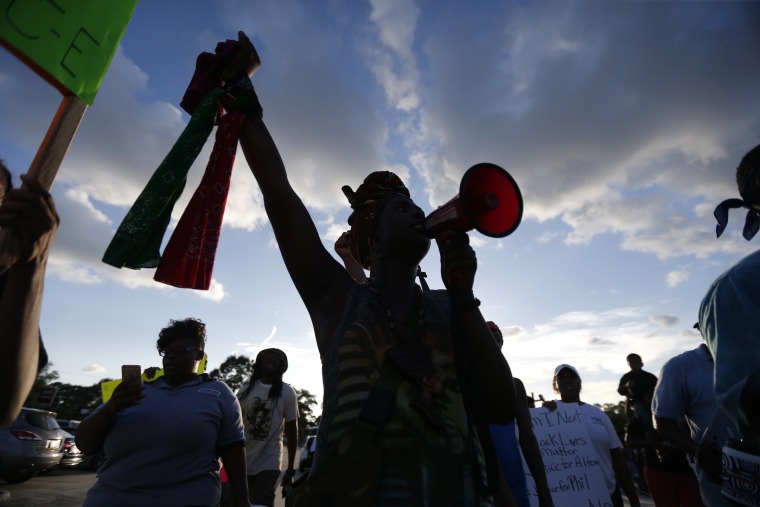Gut wrenching.
Those are the words Gregory Thomas used to describe his feelings following the news that five Dallas police officers were killed in an ambush Thursday evening.
“My collective body is hurting,” Thomas, president of the National Organization of Black Law Enforcement Executives (NOBLE), told NBCBLK.
Thomas, whose term as president ends July 21, watched in anguish as the Dallas attacks unfolded.
“This is another gut punch,” he said, adding that the shooting deaths of Alton Sterling, 31, in Baton Rouge by police officers and the shooting death of Philando Castile, 32, in Minnesota, were the first gut wrenching moments of this week. “My heart is hurting. My heart is also hurting for Chief [David] Brown [of the Dallas Police Department]. He is a colleague and a friend.”
"Let’s find a way to come together as a nation. There is equal billing for all lives —black lives, blue lives, all lives. We do not have to compete.” — Gregory Thomas
It has been a rollercoaster of a week. Since the death of Sterling and Castile, the debate that police officers are on the hunt for Black men and women has been ignited. Thursday’s incident only adds fuel to a debate that the Black Lives Matter movement ignites police hate in this country.
But for Thomas, this may be an opportunity. “We must go into our collective corners and take a breather,” he said. "Let’s find a way to come together as a nation. There is equal billing for all lives —black lives, blue lives, all lives. We do not have to compete.”

Since news broke of Sterling’s death in Baton Rouge by two police officers, Ricky Kimes, 36, has been in a state of disbelief.
“I cannot believe this happened in the city I live in,” he stated on Facebook Wednesday evening after a second video of the shooting was released via social media.
For eight years he has been a resident of the capital city of Louisiana.
“Since the ‘Blue Lives Matter’ bill passed there has been [a lot of distrust] of law enforcement here, especially in the black community,” he told NBCBLK. “[Many people] feel that the cops [would] be able to abuse their power even more. [Now] people I have come in contact with are calling for justice to be served, but many are fearful to do anything.”
Sterling, shot outside of the Triple S Food Mart in Baton Rouge, was the latest name added to a long list of Black men and women killed at the hands of police officers. That was until Wednesday when Castile died during a police altercation in Minnesota.
NAACP President Cornell William Brooks is convinced we are in the midst of a pandemic of police misconduct in this country.
“When you have the governor of Minnesota say, ‘If Castile would have been white, he might still be alive,’ the country should take note,” Brooks told NBCBLK. “When a young black man is 21 times more likely to lose his life at the hand of the police, we have reason to be concerned.”
RELATED: We Protest, We Hashtag, We Share. Now What?
Thomas believes changing the culture of policing by law enforcement professionals includes ending practices like racial profiling and stop and frisk. He also has some advice for citizens.
“Citizens also have to be calm and rational and be focused on change. You have to learn to survive,” he said. “The people of the '50s and '60s went into gymnasiums and practiced how to cower and cover your head during demonstrations. I am not saying it’s right; I am saying survive. I am not saying sell out, but be smart about your response. We have to work this out and we need you to be safe as we work this out.”
"What has changed is the advent of technology with the hope that if you see this you will believe us, and then do something about it.” — Michele Jawando
During their 40th anniversary and training conference in Washington, DC in a few weeks, Thomas is planning on meeting with other law enforcement executives to come up with an action plan.
“We will not allow this to continue. We want to make that clear to people,” he said. “Our goal is to walk out with an action plan that results in changed policing.”

Michele Jawando, Vice President of Legal Progress at the Center for American Progress, believes in order to effect change there needs to be something done about whiteness fear.
“Why the fear? The reality is that 37 percent of unarmed people killed by police in 2015 were black. The fear of black people infects everything in this system," Jawando told NBCBLK. "This is not a new phenomenon. What has changed is the advent of technology with the hope that if you see this you will believe us, and then do something about it.”
“If we want protection in the streets, we have to show up at the polls... You cannot hold a sign in the streets without holding a ballot on Election Day.” — Cornell Brooks
Brooks believes steps need to be taken beyond protests and demonstrations to combat police brutality.
“If we want protection in the streets, we have to show up at the polls. It’s just that clear. In Chicago, the people spoke with their votes and as a result Anita Alvarez was removed from office,” he said. "If we go to the polls in mass numbers and hold elected officials accountable, then we are in the position to drive criminal justice reform. You cannot hold a sign in the streets without holding a ballot on Election Day.”
Lennox Yearwood, Jr., president and CEO of Hip Hop Caucus and a native of Louisiana, agrees.
“Louisiana politics have been shady and police have been shady. We have to use our political power to create change,” he told NBCBLK. “I think that the number one thing that we can do in Louisiana is get out there and vote. We have got to be in a position where we shape policy and undo bad policy.”
RELATED: Black Caucus Demands a Vote on Guns, Warns of 'Long Hot Summer' If Action Not Taken
Yearwood believes Baton Rouge and Louisiana is in a unique position. Because they have gone through Katrina, they know what happens when the cameras go away.
“We are uniquely prepared for when that happens. This is something that, if you ever wanted to hang your hat on a movement, Louisiana could be ground zero,” he said. “There is no other state that can actually push things through on the ground and show discrepancies and the injustice like we can.”
Yearwood and Hip Hop Caucus is committed to seeing change all the way through. The non-profit and non-partisan organization connects the Hip Hop community to the civic process to create positive change.
“For us we are going to be in this for the long haul. Shifting policy is a long process,” he said, “It ain’t sexy. We want to be marathon runners in that aspect.”

